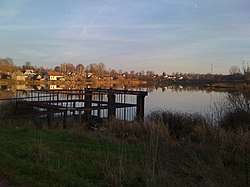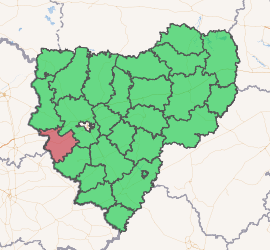Krasninsky District, Smolensk Oblast
Krasninsky District (Russian: Кра́снинский райо́н) is an administrative[1] and municipal[5] district (raion), one of the twenty-five in Smolensk Oblast, Russia. It is located in the west of the oblast and borders with Rudnyansky District in the north, Smolensky District in the east, Monastyrshchinsky District in the south, Horki District of Mogilev Region of Belarus in the southwest, and with Dubrowna District of Vitebsk Region, also of Belarus, in the west. The area of the district is 1,507.67 square kilometers (582.11 sq mi).[1] Its administrative center is the urban locality (a settlement) of Krasny.[1] Population: 12,895 (2010 Census);[2] 15,537 (2002 Census);[7] 18,758 (1989 Census).[8] The population of Krasny accounts for 33.7% of the district's total population.[2]
Krasninsky District Краснинский район | |
|---|---|
 Lake view, Krasninsky District | |
_(1780).png) Coat of arms | |

Location of Krasninsky District in Smolensk Oblast | |
| Coordinates: 54°33′36″N 31°26′06″E | |
| Country | Russia |
| Federal subject | Smolensk Oblast[1] |
| Established | 1929 (first), 1965 (second) |
| Administrative center | Krasny[1] |
| Area | |
| • Total | 1,507.67 km2 (582.11 sq mi) |
| Population | |
| • Total | 12,895 |
| • Estimate (2018)[3] | 11,930 (-7.5%) |
| • Density | 8.6/km2 (22/sq mi) |
| • Urban | 33.7% |
| • Rural | 66.3% |
| Administrative structure | |
| • Administrative divisions | 1 Urban settlements, 12 Rural settlements |
| • Inhabited localities[1] | 1 Urban-type settlements[4], 181 Rural localities |
| Municipal structure | |
| • Municipally incorporated as | Krasninsky Municipal District[5] |
| • Municipal divisions[5] | 1 Urban settlements, 12 Rural settlements |
| Time zone | UTC+3 (MSK |
| OKTMO ID | 66624000 |
| Website | http://krasniy.admin-smolensk.ru/ |
Geography
Most of the district's territory is located on the Smolensk-Krasninsky Plateau. Soils of the area are formed mostly of loam, sand, and sandy loam. Forests cover 29.3% of the territory.
The whole area of the district belongs to the drainage basin of the Dnieper. The Dnieper crosses the northern part of the district. Its major (left) tributary within the district, the Mereya, flows in the north of the district and forms a natural border between Krasninsky District and Vitebsk Region of Belarus, itself part of the Belarus–Russia border. The rivers in the eastern part of the district drain into the Sozh, another major left tributary of the Dnieper; the biggest of them is the Vikhra River.
History
The area was settled in the prehistory, and there are multiple archaeological sites in the district. Krasny (originally Krasn or Krasen) is first mentioned in 1165 by the Hypatian Codex, when Davyd Rostislavich, Prince of Smolensk, gave Krasen to his nephew, Roman of Vitebsk. Between the second half of the 14th century and the middle of the 17th century, the area belonged intermittently to the Grand Duchy of Lithuania, to Poland, and to the Grand Duchy of Moscow. Since 1654, it was finally transferred to the Tsardom of Russia.[9]
In the course of the administrative reform carried out in 1708 by Peter the Great, the area was included into Smolensk Governorate and remained there until 1929, with the exception of the brief period between 1775 and 1796, when Smolensk Governorate was transformed into Smolensk Viceroyalty. The area belonged to Krasninsky Uyezd, which was established in 1775. In 1776, Krasny was granted town status. In 1796, the uyezd was abolished but it was re-established in 1802.[9][10]
During the French invasion of Russia, Krasny played an important role, since the French army passed it twice en route to and from Russia. The Battle of Krasnoi was fought here in November 1812.
On 12 July 1929, governorates and uyezds were abolished, and Krasninsky District with the administrative center in Krasny was established. The district belonged to Smolensk Okrug of Western Oblast. On August 1, 1930 the okrugs were abolished, and the districts were subordinated directly to the oblast. On 27 September 1937 Western Oblast was abolished and split between Oryol and Smolensk Oblasts. Krasninsky District was transferred to Smolensk Oblast. Between 1941 and 1943, during WWII, the district was occupied by German troops. On 1 February 1963, during the abortive Khrushchyov administrative reform, Krasninsky District was merged into Smolensky District, but in 1965 it was re-established.[9][10]
Economy
The district's economy is mostly agricultural, specializing in beef and dairy cattle, potatoes, and flax. Industry includes flax and dairy processing, vegetable processing, and manufacture of drainage pipes (all in Krasny and Gusino).[11]
Transportation
The Moscow–Brest railway line and the M1 "Belarus" Highway both run through the northern part of the district, connecting Smolensk and Orsha. Krasny has access to M1 and is additionally connected by paved roads with Smolensk and with Orsha (so called Old Smolensk Road).
Culture and recreation
In Krasny, there is a local museum.[12]
References
Notes
- Resolution #261
- Russian Federal State Statistics Service (2011). "Всероссийская перепись населения 2010 года. Том 1" [2010 All-Russian Population Census, vol. 1]. Всероссийская перепись населения 2010 года [2010 All-Russia Population Census] (in Russian). Federal State Statistics Service.
- "26. Численность постоянного населения Российской Федерации по муниципальным образованиям на 1 января 2018 года". Federal State Statistics Service. Retrieved January 23, 2019.
- The count of urban-type settlements may include the work settlements, the resort settlements, the suburban (dacha) settlements, as well as urban-type settlements proper.
- Law #77-z
- "Об исчислении времени". Официальный интернет-портал правовой информации (in Russian). June 3, 2011. Retrieved January 19, 2019.
- Russian Federal State Statistics Service (May 21, 2004). "Численность населения России, субъектов Российской Федерации в составе федеральных округов, районов, городских поселений, сельских населённых пунктов – районных центров и сельских населённых пунктов с населением 3 тысячи и более человек" [Population of Russia, Its Federal Districts, Federal Subjects, Districts, Urban Localities, Rural Localities—Administrative Centers, and Rural Localities with Population of Over 3,000] (XLS). Всероссийская перепись населения 2002 года [All-Russia Population Census of 2002] (in Russian).
- "Всесоюзная перепись населения 1989 г. Численность наличного населения союзных и автономных республик, автономных областей и округов, краёв, областей, районов, городских поселений и сёл-райцентров" [All Union Population Census of 1989: Present Population of Union and Autonomous Republics, Autonomous Oblasts and Okrugs, Krais, Oblasts, Districts, Urban Settlements, and Villages Serving as District Administrative Centers]. Всесоюзная перепись населения 1989 года [All-Union Population Census of 1989] (in Russian). Институт демографии Национального исследовательского университета: Высшая школа экономики [Institute of Demography at the National Research University: Higher School of Economics]. 1989 – via Demoscope Weekly.
- "Archived copy" Историческая справка (in Russian). Krasninsky District Administration. Archived from the original on April 11, 2017. Retrieved March 28, 2017.CS1 maint: archived copy as title (link)
- Борис Парфенов; Ольга Хоренженкова. К истории формирования Смоленской области (in Russian). Смоленск. Retrieved June 18, 2016.
- "Archived copy" Организации (in Russian). Krasninsky District Administration. Archived from the original on May 14, 2017. Retrieved March 27, 2017.CS1 maint: archived copy as title (link)
- Краснинский краеведческий музей имени супругов Ерашовых (in Russian). Музеи России. Retrieved March 27, 2017.
Sources
- Администрация Смоленской области. Постановление №261 от 30 апреля 2008 г. «Об утверждении реестра административно-территориальных единиц и территориальных единиц Смоленской области», в ред. Постановления №464 от 27 июня 2014 г. «О внесении изменений в реестр административно-территориальных единиц и территориальных единиц Смоленской области». Опубликован: База данных "Консультант-плюс". (Administration of Smolensk Oblast. Resolution #261 of April 30, 2008 On the Adoption of the Registry of the Administrative-Territorial Units and Territorial Units of Smolensk Oblast, as amended by the Resolution #464 of June 27, 2014 On Amending the Registry of the Administrative-Territorial Units and Territorial Units of Smolensk Oblast. ).
- Смоленская областная Дума. Закон №77-з от 1 декабря 2004 г. «О наделении статусом муниципального района муниципального образования "Краснинский район" Смоленской области, об установлении границ муниципальных образований, территории которых входят в его состав, и наделении их соответствующим статусом», в ред. Закона №87-з от 31 октября 2011 г. «О внесении изменений в областной Закон "О наделении статусом муниципального района муниципального образования "Краснинский район" Смоленской области, об установлении границ муниципальных образований, территории которых входят в его состав, и наделении их соответствующим статусом"». Вступил в силу со дня официального опубликования. Опубликован: "Вестник Смоленской областной Думы и Администрации Смоленской области", №12, часть II, стр. 145, 5 декабря 2004 г. (Smolensk Oblast Duma. Law #77-z of December 1, 2004 On Granting the Status of the Municipal District to the Municipal Formation of "Krasninsky District" of Smolensk Oblast, on Establishing the Borders of the Municipal Formations Whose Territories It Comprises, and on Granting Them Appropriate Status, as amended by the Law #87-z of October 31, 2011 On Amending the Oblast Law "On Granting the Status of the Municipal District to the Municipal Formation of "Krasninsky District" of Smolensk Oblast, on Establishing the Borders of the Municipal Formations Whose Territories It Comprises, and on Granting Them Appropriate Status". Effective as of the official publication date.).
Further reading
- Encyclopedia of the Smolensk Oblast (in Russian)